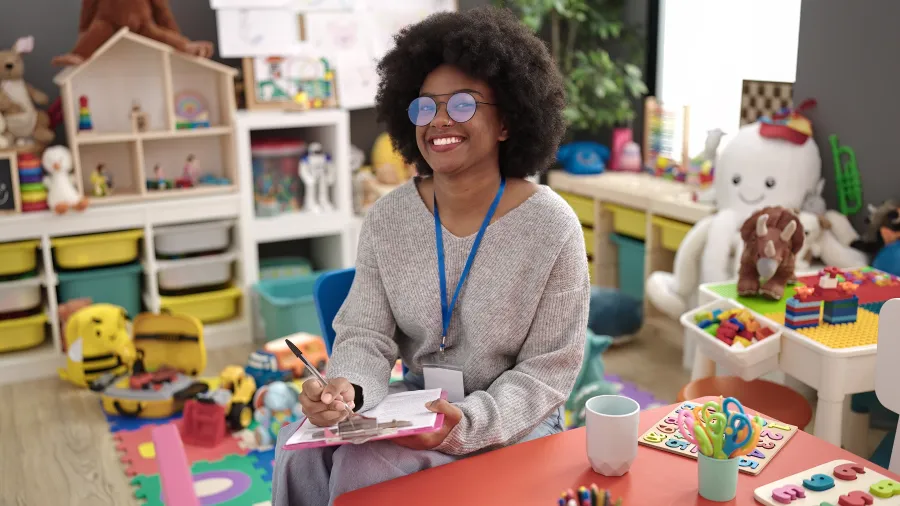Expert Advice: Building a Strong Alliance with Your Child’s Teacher.

As the U.S. embarks on the commencement of the 2023-2024 school year, theGrio engaged in a conversation with King to explore ways in which parents can establish strong partnerships with their children’s teachers. King emphasized the importance of parents proactively introducing themselves and their kids to the educators, proposing that this interaction occur via a letter or email within the initial week of the school year.
“Inform them about their learning style. Clarify your expectations regarding their classroom conduct. And outline your preferred method of notification should they not meet those expectations,” she advised.
With average classroom sizes currently ranging from 24 to 30 students, it can indeed be a daunting task for teachers to fully comprehend each child’s unique needs throughout the school year. Nardos King emphasized the value of parents composing introductory letters to teachers, allowing educators to gain insights from the parent’s perspective regarding expectations for both teacher and parent roles. Drawing upon her 34-year career in education and her own experience as a parent, King attested to the enduring effectiveness of this approach, which she has encountered from both the recipient’s and sender’s viewpoints. Furthermore, she noted that this method isn’t limited to teachers; parents can also address such letters to the school’s principal, a practice she first discovered during her early days as a principal’s secretary.
She remarked, “When I read the letters people wrote, I was pleasantly surprised by the idea.” She elaborated that those parents had written to introduce their child and specify the qualities they hoped their child’s teacher would possess. While parents may not always have the option to request a particular teacher for their child, they can certainly articulate the attributes they value or believe would contribute to their child’s success.
King also shared that she personally employed this method when her own children were of school age. Each school year, she would correspond with the principal, explicitly outlining the characteristics she desired in her children’s teachers, and she found this proactive approach to be notably effective.
She shared, “My daughter was three years behind my son, and they had the same teachers throughout elementary school because I was consistently satisfied with their teachers.”
King emphasized that nurturing a positive relationship with your children’s teachers extends beyond initial introductions. She encouraged parents to take an active role, volunteering their time when the school seeks parent assistance for events and activities, attending special programs, and even considering joining the Parent-Teacher Association (PTA), a dependable way to make a favorable impression on teachers and school staff. King advised becoming “a trusted community member they can rely on.” This extra effort not only benefits the school and your rapport with the staff but, as she noted, “People also tend to pay attention to your children.”
Addressing common misconceptions that parents and teachers may hold about each other, King noted that not all parents who may not participate in school activities or events are necessarily disengaged or unconcerned about their children’s well-being and success.

“I believe that every parent who sends their children to school genuinely cares about their well-being,” King expressed. “Their individual life circumstances may lead them to engage in various ways.”
King pointed out that although some parents can attend every PTA meeting, music recital, and school sporting event, their level of care for their child isn’t necessarily greater than that of any other parent. “There’s a common misperception at times that parents who don’t attend these events don’t have a genuine concern for their children. That’s simply not accurate,” she emphasized.
For parents who may not have the flexibility to participate as actively as they wish, there’s still the option to send letters and emails introducing themselves to their children’s teachers and school administrators. These communications can serve as an opportunity to explain their circumstances, ensuring teachers don’t form any misguided impressions.
Similarly, there are common misconceptions that parents may have about teachers that could hinder a more positive dynamic. King, drawing from her 34 years of experience in education, debunked one such misconception – the idea that teachers somehow don’t like children. She stressed, “I believe that, often, when people are upset, the easiest thing to say is, ‘Well, they just don’t like my child.’ I don’t think that’s ever the case.”
King stressed that individuals who aren’t genuinely passionate about nurturing young minds seldom pursue careers in teaching. The challenges of meager compensation and limited resources that many educators confront often make it a profession suited only for those deeply committed to the cause. Drawing from her extensive 34-year career, King acknowledged that there is room for improvement in how schools support students facing difficulties, but she affirmed, “Nobody wishes to witness a child’s failure.”



